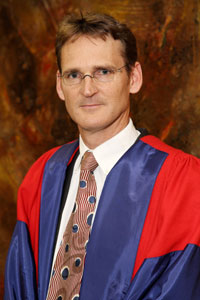So what place for the Bill of Rights?
01 December 2009 | Story by Newsroom Pause for thought: In his inaugural lecture, Prof Anton Fagan refuted the position that the Bill of Rights is reason enough for changes to the country's Common Law.
Pause for thought: In his inaugural lecture, Prof Anton Fagan refuted the position that the Bill of Rights is reason enough for changes to the country's Common Law.
In the Faculty of Law, Professor Anton Fagan has a reputation for clear, ordered and incisive thinking. Those are qualities he displayed in spades as he delivered his inaugural lecture, titled, pointedly, The secondary role of the spirit, purport and objects of the Bill of Rights in the Common Law's development on 24 November.The Constitutional Court has repeatedly - if not always expressly - endorsed the proposition that the spirit, purport and objects of the country's Bill of Rights may be reason enough for the development of the Common Law, said Fagan, who holds the WP Schreiner Chair in the Department of Private Law. This means that every court is obliged to adapt the Common Law whenever it does not live up to the spirit, purport and objects of the Bill of Rights.
And, Fagan cited, as the Court put it in one of its leading judgments: "Where the Common Law deviates from the spirit, purport and objects of the Bill of Rights, courts have an obligation to develop it by removing that deviation."
But, said Fagan, this proposition is false. Rather, the role of the Bill of Rights in the development of the Common Law is merely - to the dismay of judges and legal folk everywhere, perhaps - a secondary one, argued Fagan. Instead, it serves only as a "tiebreaker".
"The Constitution regards the spirit, purport and objects of the Bill of Rights only as reasons for choosing between ways of developing the Common Law that are already justified by reasons that have nothing to do with the spirit, purport and objects of the Bill of Rights."
In the rest of his lecture, Fagan meticulously presented his argument. It is a lecture that would give many pause for thought, and may demand a few readings, said former dean Professor Hugh Corder in his wrap-up.
"Your lecture leaves no one in any doubt as to your views," said Corder. "So if you were to be, perish the thought, proven wrong, you'd be wrong clearly."
Download a podcast of Fagan's lecture.
 This work is licensed under a Creative Commons Attribution-NoDerivatives 4.0 International License.
This work is licensed under a Creative Commons Attribution-NoDerivatives 4.0 International License.
Please view the republishing articles page for more information.










